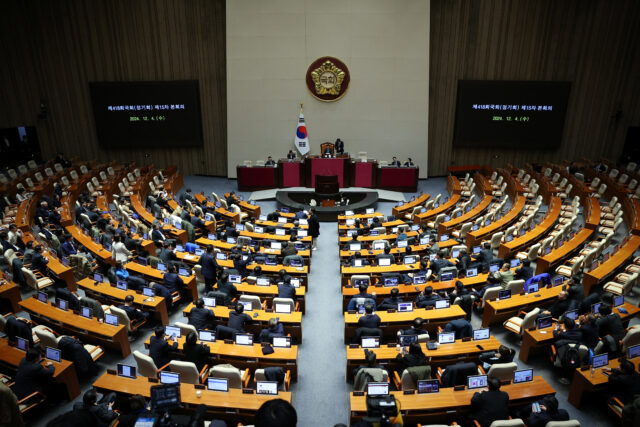SEOUL – At his confirmation hearing three months ago, South Korea’s defence minister Kim Yong-hyun rejected accusations from the opposition that he wanted to impose martial law. It was, the conservative hardliner said, political propaganda.
But when tensions between President Yoon Suk Yeol and his political opponents reached a boiling point this week, it was Kim, a longtime confidant of Yoon, who recommended imposing martial law, according to a senior military official and impeachment filings by opposition figures on Wednesday.
Kim proposed the idea because he believed the liberal opposition had pushed Yoon to the edge, said the military source, who denied that planning for martial law had been in the works since before the confirmation hearing.
Yoon’s shock move on Tuesday divided his ministers and his ruling People Power Party and unleashed six hours of political chaos in South Korea. His televised late-night declaration of martial law plunged one of Asia’s largest economies into crisis and blemished the reputation of a U.S. ally that transitioned from dictatorship to a democratic success story in the 1980s.
By the time Yoon, 63, rescinded martial law early Wednesday following a vote by the opposition-dominated parliament to reject it, his political fortunes and his grip on the country had imploded spectacularly.
As the day wore on, many of Yoon’s allies deserted him and support grew across the political spectrum for his impeachment and removal from office. He now faces an impeachment vote that the opposition is seeking to push through this week.
This account of the moments leading up to the martial law declaration and its aftermath is based on Reuters interviews with more than a dozen officials, lawmakers and staffers. Some spoke on the condition of anonymity to discuss a sensitive issue.
Four of these people highlighted the pivotal role played by Kim, a high-school buddy of Yoon, in supporting and facilitating a botched power grab that the president said was necessary to eradicate unspecified “pro-North Korean and anti-state forces” arrayed against him and the country.
The defence ministry said it had no comment on detailed questions posed by Reuters about Kim’s involvement in planning the decree. In a statement released through the ministry on Wednesday, Kim took responsibility for the orders given to the troops who stormed the parliament building, and offered to resign.
A spokesperson for Yoon’s office told Reuters that the martial law decree was done in accordance with the constitution and was necessary to protect democracy.
There have been more than a dozen declarations of martial law since the foundation of the South Korean republic in 1948, the last in 1979-1980 following the assassination of former President Park Chung-hee.
CABINET MEETING
The speed with which long-simmering disputes between the conservative government and its opponents over budgets, investigations and scandals spiralled stunned South Korea and its allies.
It also blindsided the ruling party, whose leader Han Dong-hoon told reporters the presidential office had not consulted with him about the move. He joined calls for Yoon to rescind the order.
About four hours before his 10:23 p.m. announcement of martial law, Yoon’s office first told the national police chief to be on standby, a police official told Reuters. At 9 p.m. Yoon convened a cabinet meeting.
At that meeting “most” members were against the plan, according to three government officials. Yoon forged ahead regardless.
Among those opposed were Prime Minister Han Duck-soo, a Yoon appointee who would become acting president if Yoon is removed from office, as well as Foreign Minister Cho Tae-yul, and Finance Minister Choi Sang-mok, one of the sources said.
A spokesperson for the prime minister’s office said they had no comment. A foreign ministry official confirmed Cho attended cabinet meetings before and after the martial law announcement but did not elaborate. A finance ministry spokesperson could not be reached outside business hours on Wednesday.
Yoon, who was narrowly elected in 2022, has battled record low approval ratings as scandals engulfed him and his wife, and has expressed increasing frustration over opposition moves to control government budgets.
“The so-called Chungam faction, those who went to the same school as the president, these people have been assigned to positions with authority over martial law and those able to carry out martial law for several months already,” said Kim Min-seok, a lawmaker from the opposition Democratic Party, who questioned Kim Yong-hyun at the September hearing.
Chungam is the name of the high school that Yoon attended alongside Kim Yong-hyun, who would become a key confidant of Yoon and his head of presidential security.
While the defence minister played an influential role, Kim Min-seok said he believes the president was ultimately calling the shots.
Yoon sought to use the military as a tool to prevent investigations into him and his wife over influence peddling allegations, among other scandals, and to maintain power, Kim Min-seok told Reuters in an interview at his office on Wednesday. Yoon and his wife have denied wrongdoing.
Outside the office, the halls of the parliament building bore the damage and debris from clashes with special forces troops the night before.
SCRAMBLE FOR PARLIAMENT
Kim Min-seok was among 190 lawmakers who rushed back to the domed National Assembly building on the south bank of the Han River after Yoon’s TV address.
Central to the failure of Yoon’s gambit was the swift and unanimous vote by lawmakers who defied police and special forces troops to gather in the legislature to block the martial law decree.
The main opposition parties summoned members of parliament and their staffers back to the building when they heard Yoon’s speech. A short time later came a military decree banning activity by parliament and political parties and calling for government control of the media.
Confusion reigned as elected representatives, journalists, and others grappled with what the order meant for them. On YTN, a major broadcaster, a male anchor was visibly shaken, his voice trembling after Yoon’s address.
By 10:50 p.m., just 25 minutes after Yoon’s speech, police were blocking access to the parliament, Kim Min-gi, the Secretary-General of the National Assembly, said at a briefing on Wednesday.
An “uncountable” number of police surrounded the main doors of the national assembly hall building, said Jeon Ki-eun, with the office of the parliamentary leader of the Democratic Party of Korea.
“Police were at all of the doors blocking lawmakers and citizens from going in and out,” he said.
Lee Jun-seok, New Reform Party lawmaker and ousted former leader of Yoon’s People Power Party, said it appeared that some police did not know what to do.
“I overheard some of them communicating over walkie-talkies, some saying ‘let lawmakers in’ and at other times ‘don’t let them in’,” he said.
Some lawmakers, including Kim Min-seok and senior Democratic Party leaders, scaled the walls to enter the complex.
At about 11:40 p.m. the military began deploying 230 soldiers in 24 helicopter flights into the national assembly compound, and another 50 entered over a fence.
The American-designed UH-60P Black Hawk helicopters landed on a sports field inside the complex and disgorged masked soldiers.
Park Sun-won, a member of parliament who previously worked for the National Intelligence Service, provided Reuters with his analysis that concluded the troops included members of the 707th Special Missions Group, which is tasked with anti-terrorism and top-secret missions, and the 1st Airborne Special Forces Brigade, which had a history of involvement with a coup in 1979.
The military contingent also included the Special Duty Team (SDT) of the Army Capital Defense Command, another anti-terrorism unit.
Kim Tae-hyung, a member of boy band BTS who is known professionally as V, is serving his mandatory national service with the SDT in Seoul, though Reuters could not determine whether he participated in the operation.
When asked about the units deployed and whether the K-pop star was involved, the defense ministry said it could not comment on specific units or agents. BTS’s agency, HYBE, was not immediately available for comment.
Another Democratic Party lawmaker, Kim Nam-geun, said he and 10 others were blocked by troops from entering a side door and resorted to climbing a wall.
“It was very intense,” he said.
The troops tried to enter the main building, breaking windows, raising fears that they would block a vote, but lawmakers’ aides and citizens helped build a barricade to block access.
Jeon said he and other staffers stacked chairs, tables, flower pots and other furniture against the doors, hoping that any lawmakers who had yet to arrive could make their way in through hidden corridors.
Footage showed some staffers using fire extinguishers to keep troops at bay. Lee Jun-seok said the troops were armed with non-lethal projectiles.
While scuffles broke out at the gates, there was no serious violence. And despite the order for media censorship, no such control was exerted.
“The generation that experienced real martial laws in Korea see this as child’s play and an amateurish show because of what appeared to be the soldiers’ inability to lock down the National Assembly, or perhaps even lack of communication from the command,” said Duyeon Kim, a Seoul-based analyst with the Center for a New American Security.
HISTORIC VOTE
Shortly before 1 a.m., National Assembly Speaker Woo Won-shik convened a session. Within 10 minutes the gathered lawmakers unanimously passed a resolution calling for Yoon to lift the state of martial law.
Under South Korea’s constitution the president must rescind a martial law decree if the parliament votes to oppose it.
“Inside the voting room, Democrats were pretty vocal and were absolutely unified on stopping this situation,” Lee Jun-seok said. “It was obvious that the Democrats were in the driving seat, leading up to the vote.”
Some members of Yoon’s ruling party showed up for the vote, which passed 190-0.
Around 1:10 a.m., troops started leaving the parliament building. The last were gone by 2 a.m.
Finally, at 4:30 a.m., Yoon backed down and said he would lift the martial law, sparking joyous celebrations among the thousands of demonstrators gathered outside the parliament. — Reuters





 Adam Heather, Senior Regional Sales Manager at Alliance Laundry Systems LLC, stated,
Adam Heather, Senior Regional Sales Manager at Alliance Laundry Systems LLC, stated, The event featured opening remarks from both Adam Heather and Phillip Chan, followed by an engaging presentation on the diverse range of Speed Queen products, including Top Load Washers, Front Load Washers, LPG Heated Dryers, Electric Heated Dryers, and Stacked Washer/Dryers. Attendees were captivated by the product video showcasing the Speed Queen home lineup, emphasizing the brand’s commitment to delivering commercial-quality washers and dryers that bring lasting performance and longevity to every home.
The event featured opening remarks from both Adam Heather and Phillip Chan, followed by an engaging presentation on the diverse range of Speed Queen products, including Top Load Washers, Front Load Washers, LPG Heated Dryers, Electric Heated Dryers, and Stacked Washer/Dryers. Attendees were captivated by the product video showcasing the Speed Queen home lineup, emphasizing the brand’s commitment to delivering commercial-quality washers and dryers that bring lasting performance and longevity to every home. Moving forward, Alliance Laundry Systems is eager to work with AHAM Corp. to make Speed Queen home products widely available in various retail stores across the Philippines. Plans are also under way to market the brand through appropriate channels, supporting local retailers and enhancing overall brand presence.
Moving forward, Alliance Laundry Systems is eager to work with AHAM Corp. to make Speed Queen home products widely available in various retail stores across the Philippines. Plans are also under way to market the brand through appropriate channels, supporting local retailers and enhancing overall brand presence.









